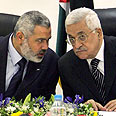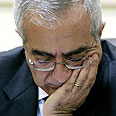

Former US President Jimmy Carter published an article in the Washington Post urging the world to support Palestinian unity even as Palestinian President Mahmoud Abbas stressed that he would not ask Hamas to recognize Israel.
Abbas arrived in Cairo Tuesday for the official signing of a unity deal between his Fatah and its long-time rival, to take place Wednesday.
He said the only thing the Quartet must know is that Hamas would refrain from violence and "be interested in the peace process."
Abbas said Israel does not want to see the Palestinians unified because the rivalry between the two factions is helpful to the state.
"There are no guarantees for the success of the agreement, which has many enemies, and there have been attempts to harm it by a number of people," Abbas said during his visit to the Egyptian capital.
"Despite the fact that there are no guarantees that this agreement will work, there is a will and a way to agree," he added. "We will not demand that Hamas recognize Israel. We will establish a government of technocrats and not ask Hamas to recognize Israel."
'Unity gov't can negotiate on Shalit'
In his article in the Post, Carter urged support for the agreement. "If the United States and the international community support this effort, they can help Palestinian democracy and establish the basis for a unified Palestinian state in the West Bank and Gaza that can make a secure peace with Israel. If they remain aloof or undermine the agreement, the situation in the occupied Palestinian territory may deteriorate with a new round of violence against Israel," he wrote.
Carter also accused the international community of "exacerbating differences" between the factions. "In 2006, Hamas won the legislative election, but the 'Quartet' — the United States, the European Union, the United Nations and Russia — rejected it and withheld aid, and the unity government collapsed. Competition between the two factions turned vicious, and each side has arrested the other’s activists," he wrote.
He also sees the deal as a basis for a two-state solution. "With Quartet support, a unity government can negotiate with Israel an exchange of prisoners for the captured Israeli soldier Gilad Shalit and a settlement freeze," Carter explained.
'Hamas to blame Fayyad for arrests'
Meanwhile, as the deal was finalized for Wednesday's signing, it appeared that one of its enthusiasts is to be left out of a future unity government. Salam Fayyad, the Palestinian prime minister, will apparently not continue in office.
"Neither Hamas nor Fatah are interested in seeing Fayyad at the head of the Palestinian government," explains Hani al-Masri, a Palestinian political analyst who took part in the truce talks. "Nothing is impossible in politics, but up until now Fayyad has not been the preference of either side."
Indeed, Abbas has never been known as a Fayyad supporter, possibly because the latter has often won more respect from the world over his moderate policies.
Hamas spokesman Mahmoud al-Zahar said his organization has asked that the unity government be led by someone from Gaza, though not from within Hamas's ranks.
"There are many more reliable leaders than Fayyad. He may be a professional figure, but that doesn't mean it's a good time for him to be prime minister," explained a source from within the organization.
According to a recent poll conducted by Dr. Faisal Awartani, 58% of the West Bank's residents would like to see Fayyad continue in his position.
"I think he should be given the job of assembling a government. He has performed his office well and there is no reason he shouldn't continue. It will be stupidity if he is not reelected," Fatah official Kadura Fares told Ynet.
"Unfortunately I think that this will indeed not happen," Fares said, explaining, "Hamas will accuse him of closing down their institutions in the West Bank and as ordering arrests of their operatives."
- Follow Ynetnews on Facebook















